Brief Papers
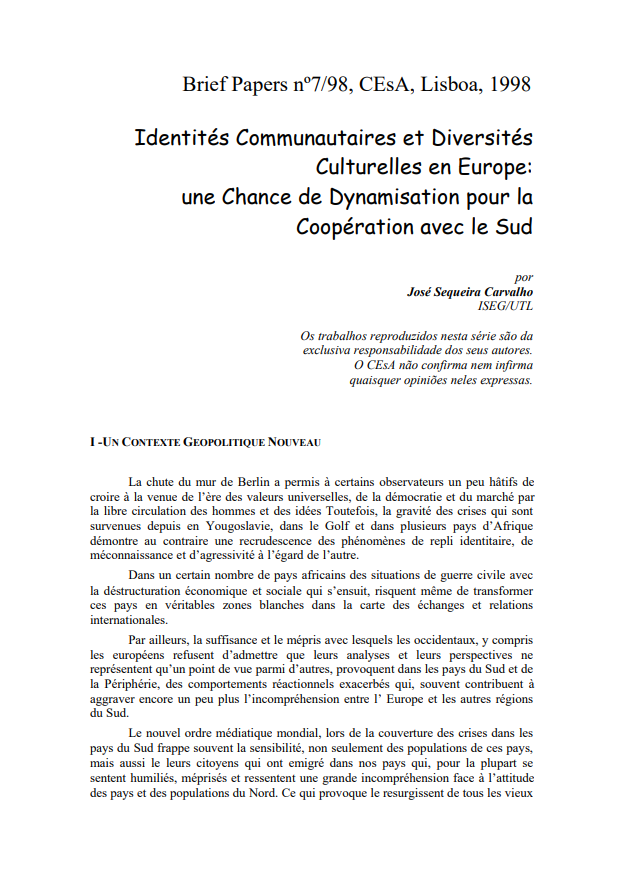
Brief Paper 7/1998: Identités Communautaires et Diversités Culturelles en Europe: Une chance de dynamisation pour la coopération avec le Sud
Abstract:
In Identités Communautaires et Diversités Culturelles en Europe: Une chance de dynamisation pour la coopération avec le Sud we talk about how the fall of the Berlin Wall allowed some rather hasty observers to believe in the arrival of an era of universal values, democracy and market through the free circulation of people and ideas. However, the gravity of the crises that have occurred since then in Yugoslavia, the Gulf and several African countries show, on the contrary, a resurgence of the phenomena of identity withdrawal, misunderstanding and aggression towards the other. In a number of African countries, civil war situations with the resulting economic and social destructuring may even transform these countries into veritable white zones on the map of trade and international relations. Moreover, the presumption and contempt with which Westerners, including Europeans, refuse to admit that their analyses and perspectives represent only one point of view among others, provoke in the countries of the South and of the periphery, exacerbated reactionary behaviours that often contribute to further aggravate the lack of understanding between Europe and other regions of the South. The new world media order, in covering the crises in the countries of the South, often touches the sensibilities not only of the populations of these countries, but also of their citizens who have emigrated to our countries, who, for the most part, feel humiliated, scorned and feel a great lack of understanding of the attitude of the countries and populations of the North. This causes the resurgence of all the old disputes, including psychopathological disputes, between ethnicities, religions and communities of different origins.
Quotation:
Carvalho, José Sequeira. 1998. “Identités communautaires et diversités culturelles en Europe : une chance de dynamisation pour la coopération avec le Sud”. Instituto Superior de Economia e Gestão – CEsA Brief papers nº 7-1998.
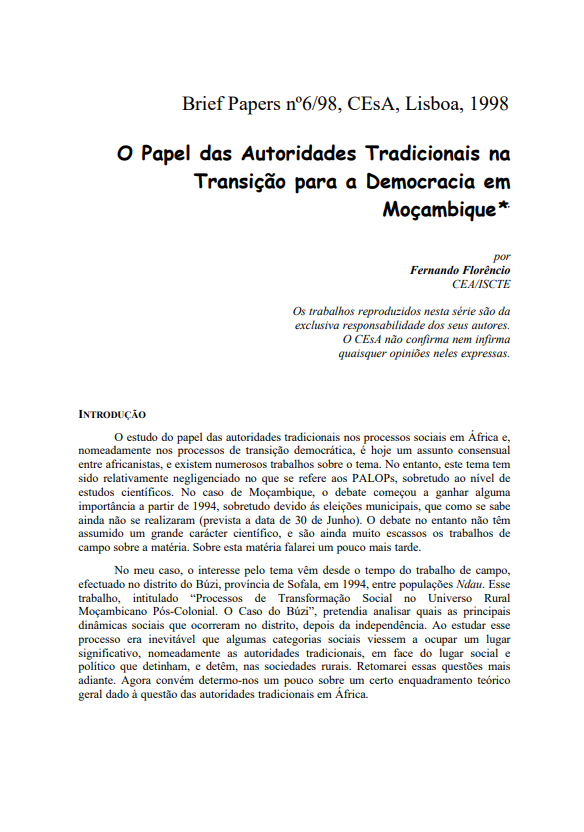
Brief Paper 6/1998: O Papel das Autoridades Tradicionais na Transição para a Democracia em Moçambique
Abstract:
The study of the role of traditional authorities in social processes in Africa, namely in the processes of democratic transition, is today a consensual issue among Africanists, and there are numerous works on the subject. However, this theme has been relatively neglected in what concerns the PALOPs, especially at the level of scientific studies. In the case of Mozambique, the debate started to gain some importance as from 1994, mainly due to the municipal elections, which as we know have not yet taken place (scheduled for 30 June). However, the debate has not taken on a scientific character, and fieldwork on the subject is still very scarce. I will talk about this subject a little later. In my case, the interest in the theme comes from the time of fieldwork, carried out in Búzi District, Sofala Province, in 1994, among Ndau populations. This work, entitled “Processes of Social Transformation in the Rural Universe of Post-Colonial Mozambique. The Case of Búzi”, intended to analyse the main social dynamics that occurred in the district after independence. In studying this process it was inevitable that some social categories would come to occupy a significant place, namely the traditional authorities, in view of the social and political place they held, and hold, in rural societies. I will return to these issues later. It is now convenient to dwell for a moment on a certain general theoretical framework given to the question of traditional authorities in Africa. Communication presented at the CESA 1998 Seminar: A Problemática do Desenvolvimento – Historicidade e Contributos Actuais numa Óptica Transdiciplinar (The Problem of Development – History and Current Contributions from a Transdisciplinary Perspective), Conference O Papel das Autoridades Tradicionais na Transição para a Democracia em Moçambique (The Role of Traditional Authorities in the Transition to Democracy in Mozambique), 14th May 1998.
Quotation:
Florêncio, Fernando. 1998. “O papel das autoridades tradicionais na transição para a democracia em Moçambique”. Instituto Superior de Economia e Gestão – CEsA Brief papers nº 6-1998.
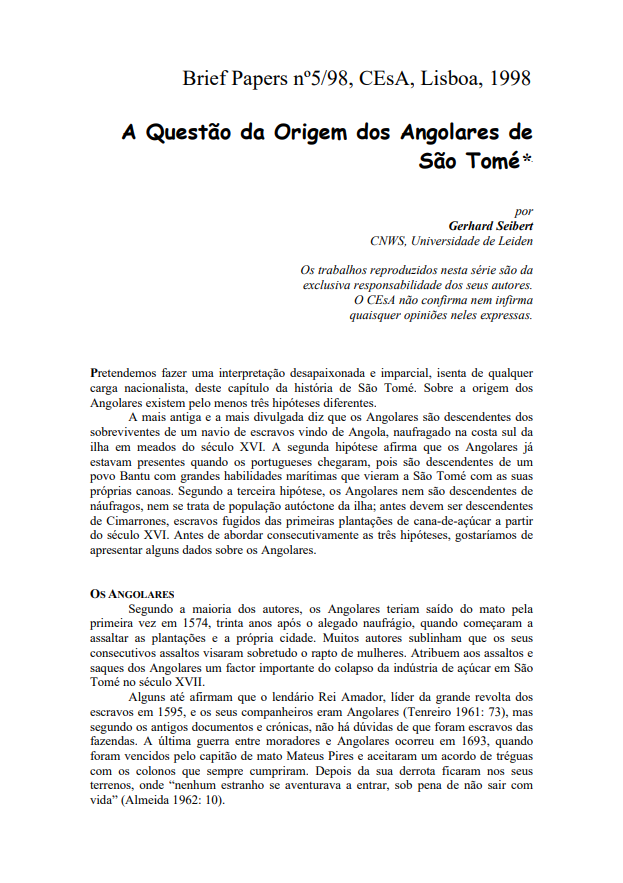
Brief Paper 5/1998: A Questão da Origem dos Angolares de São Tomé
Abstract:
We intend to make a dispassionate and impartial interpretation, free of any nationalist charge, of this chapter in the history of São Tomé. There are at least three different hypotheses about the origin of the Angolares. The oldest and most widespread says that the Angolares are descendants of the survivors of a slave ship from Angola that sank off the southern coast of the island in the mid-sixteenth century. The second hypothesis states that the Angolares were already present when the Portuguese arrived, since they are descendants of a Bantu people with great maritime skills who came to São Tomé with their own canoes. According to the third hypothesis, the Angolares are neither descendants of castaways, nor are they an indigenous population of the island; rather, they must be descendants of Cimarrones, runaway slaves from the first sugar cane plantations after the 16th century. Before dealing consecutively with the three hypotheses, we would like to present some data about the Angolares. Paper presented at the 1998 CESA Seminar: A Problemática do Desenvolvimento – Historicidade e Contributos Actuais numa Óptica Transdiciplinar (The Problem of Development – History and Current Contributions from a Transdisciplinary Perspective), Conference on A Questão da Origem dos Angolares em São Tomé (The Question of the Origin of the Angolares in São Tomé), 19 May 1998.
Quotation:
Seibert, Gerhard. 1998. “A questão da origem dos Angolares de São Tomé”. Instituto Superior de Economia e Gestão – CEsA Brief papers nº 5-1998.
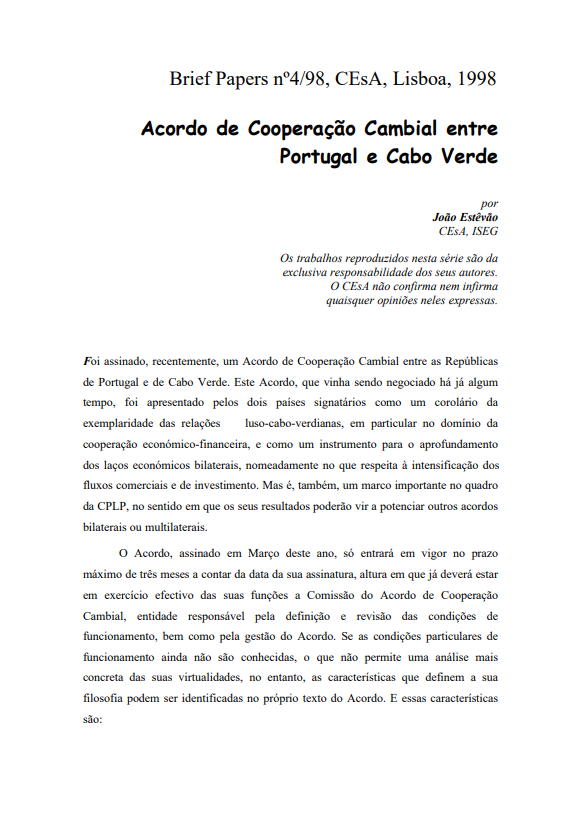
Brief Paper 4/1998: Acordo de Cooperação Cambial entre Portugal e Cabo Verde
Abstract:
An Exchange Cooperation Agreement was recently signed between the Republics of Portugal and Cape Verde. This agreement, which had been under negotiation for some time, was presented by the two signatory countries as a corollary to the exemplary nature of Luso-Cape Verde relations, especially in the area of economic and financial cooperation, and as an instrument for strengthening bilateral economic ties, especially as regards the intensification of trade and investment flows. But it is also an important milestone in the framework of the CPLP, in the sense that its results may come to enhance other bilateral or multilateral agreements. The Agreement, signed in March this year, will only come into force within a maximum of three months from the date it is signed, by which time the Exchange Cooperation Agreement Commission, the entity responsible for defining and reviewing the operating conditions, as well as for managing the Agreement, should already be performing its duties. If the specific operating conditions are not yet known, which does not allow a more concrete analysis of its virtualities, however, the characteristics which define its philosophy may be identified in the text of the Agreement itself. A summary of Acordo de cooperação cambial entre Portugal e Cabo Verde (Agreement on Exchange Rate Co-operation between Portugal and Cape Verde), entitled Moeda une Portugal e Cabo Verde (Currency unites Portugal and Cape Verde), was published in Informação Lusófona (UCCLA), no. 6, April 1998, p. 2.
Quotation:
Estêvão, João. 1998. “Acordo de cooperação cambial entre Portugal e Cabo Verde”. Instituto Superior de Economia e Gestão – CEsA Brief papers nº 4-1998.
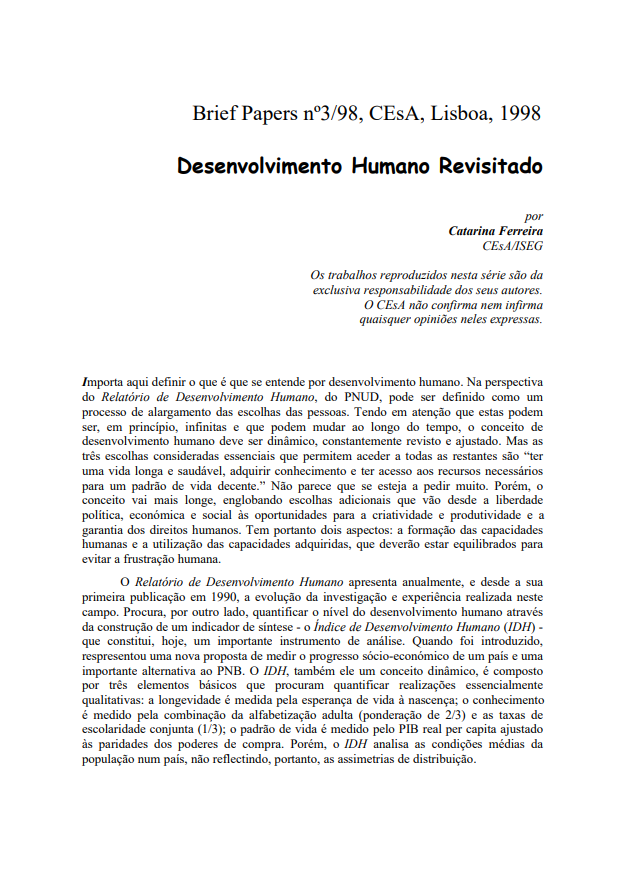
Brief Paper 3/1998: Desenvolvimento Humano Revisitado
Abstract:
Every year since it was first published in 1990, the Human Development Report presents the evolution of research and experience in this field. It also seeks to quantify the level of human development by constructing a synthesis indicator – the Human Development Index (HDI) – which is now an important tool for analysis. When it was introduced, it represented a new proposal to measure the socio-economic progress of a country and an important alternative to the GNP. The HDI, itself a dynamic concept, is made up of three basic elements which seek to quantify essentially qualitative achievements: longevity is measured by life expectancy at birth; knowledge is measured by combining adult literacy (weighting 2/3) and joint schooling rates (1/3); standard of living is measured by real GDP per capita adjusted for purchasing power parities. However, the HDI analyses the average conditions of the population in a country and does not therefore reflect distributional asymmetries. A first version of Desenvolvimento humano revisitado was prepared for Projecfo ED/96/02 Decentralised Cooperation, Fight against Exclusion and Human Development in Portugal, Italy and Belgium, an EC project being prepared by three European NGOs: ACEP – Portugal, Ricerca e Coopcrazione – Italy and ITECO – Belgium.
Quotation:
Ferreira, Catarina. 1998. “Desenvolvimento humano revisitado”. Instituto Superior de Economia e Gestão – CEsA Brief papers nº 3-1998.
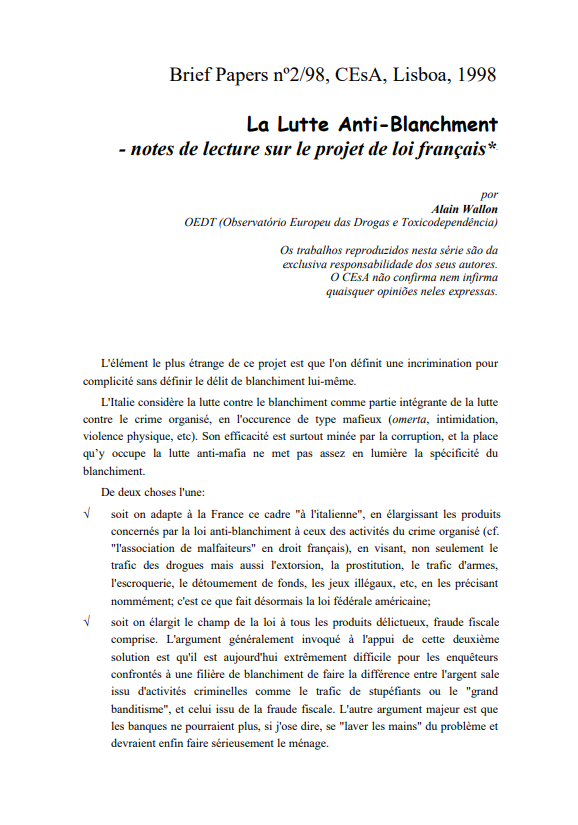
Brief Paper 2/1998: La Lutte Anti-blanchment: Notes de lecture sur le project de loi français
Abstract:
The strangest thing about this draft is that it defines an incrimination for aiding and abetting without defining the offence of money laundering itself. Italy considers the fight against money laundering to be an integral part of the fight against organised crime, in this case of the mafia type (omertà, intimidation, physical violence, etc.). Its effectiveness is mainly undermined by corruption, and the place of the fight against the mafia does not sufficiently highlight the specific nature of money laundering. The tax weapon should not be forgotten. It brought Capone down. It will still be necessary to ensure that the determination to pursue the ordinary citizen in France, sometimes arbitrarily, is transformed with equal efficiency against organised crime. Finally, the participation of banks in the process of defining new rules seems indispensable. La lutte anti-blanchment: notes de lecture sur le project de loi français served as a basis for the lecture “Mundialização, Drogas e Sistema Financeiro” (Globalisation, Drugs and the Financial System) given by Prof. Alain Wallon on 17 March as part of the Master’s in International Development and Cooperation, at the invitation of Prof. René Tapia Ormázabal, in the subject of Financial Systems and Development Finance.
Quotation:
Wallon, Alain. 1998. “La lutte anti-blanchment: notes de lecture sur le project de loi français”. Instituto Superior de Economia e Gestão – CEsA Brief papers nº 2-1998.
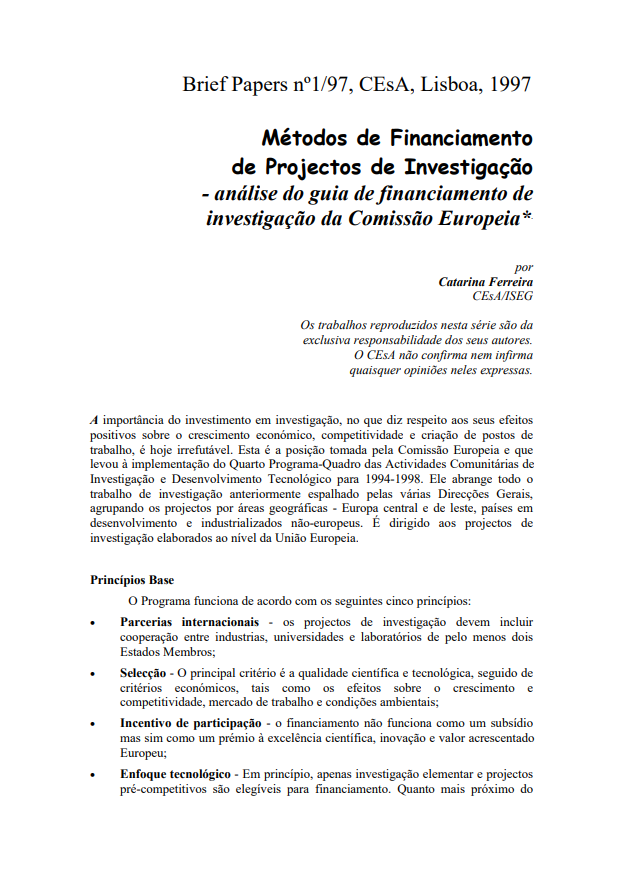
Brief Paper 1/1997: Métodos de Financiamento de Projectos de Investigação: Análise do guia de financiamento de investigação da Comissão Europeia
Resumo:
The importance of investment in research, in terms of its positive effects on economic growth, competitiveness and job creation, is now irrefutable. This is the position taken by the European Commission and which led to the implementation of the Fourth Framework Programme of Community Research and Technological Development Activities for 1994-1998. It covers all the research work previously spread across the various Directorates-General, grouping projects by geographical area – central and eastern Europe, developing countries and industrialised non-European countries. It is targeted at research projects carried out at European Union level. If the application is successful, the project coordinators are invited for contract negotiations – usually in Brussels or Luxembourg. Applicants must be prepared to provide more sophisticated information on the structure, implementation and costs of the project. For this purpose they receive forms that have to be filled in and submitted to the Commission within the specified period. Work on the project should not start until all the contractual negotiation stages are completed and the contract is signed by the partners and the Commission departments responsible. Métodos de financiamento de projectos de investigação: análise do guia de financiamento de investigação da Comissão Europeia has been prepared on the basis of the book EC research funding – a guide for applicants, European Commission, Office for Official Publications of the European Communities, Brussels-Luxembourg. 1996, 205p.
Citação:
Ferreira, Catarina. 1997. “Métodos de financiamento de projectos de investigação: análise do guia de financiamento de investigação da Comissão Europeia”. Instituto Superior de Economia e Gestão – CEsA. Brief papers nº 1-1997.
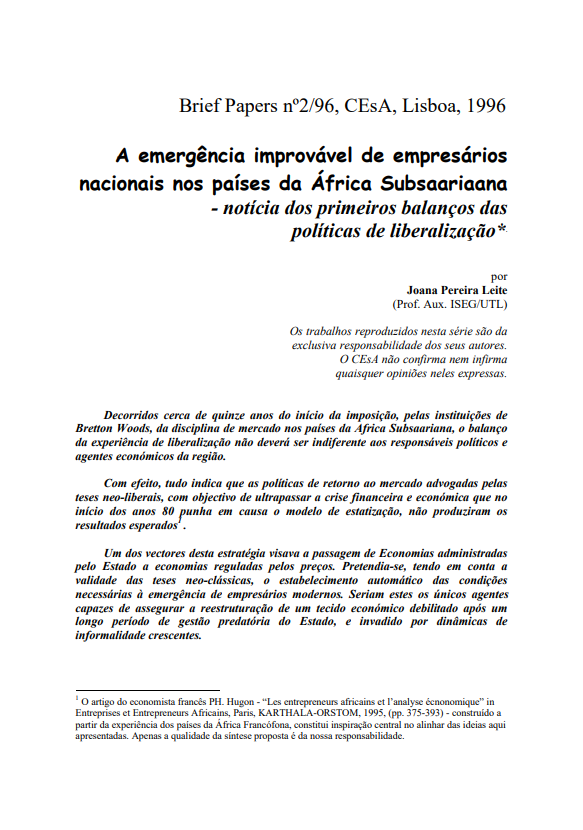
Brief Paper 2/1996: A Emergência Improvável de Empresários Nacionais nos Países da África Subsaariaana: Notícia dos primeiros balanços das políticas de liberalização
Abstract:
About fifteen years after the Bretton Woods institutions started imposing market discipline on the countries of Sub-Saharan Africa, the assessment of the liberalisation experience should not be indifferent to political leaders and economic players in the region. In fact, everything indicates that the policies of return to the market advocated by the neo-liberal theses, with the aim of overcoming the financial and economic crisis which, at the beginning of the 1980s, called the nationalisation model into question, did not produce the expected results. One of the vectors of this strategy was the transition from state-managed economies to price-regulated economies. Taking into account the validity of the neoclassical theses, the aim was the automatic establishment of the necessary conditions for the emergence of modern entrepreneurs. These would be the only agents capable of ensuring the restructuring of a weakened economic fabric after a long period of predatory management by the state, and invaded by growing dynamics of informality. A emergência improvável de empresários nacionais nos países da África Subsaariaana: notícia dos primeiros balanços das políticas de liberalização is not intended to recall the “formal/informal” debate, so dear to the economic literature of the last two decades. Bearing in mind the extreme economic complexity of African societies, the aim is simply to highlight some relevant, though not always evident, aspects of recent reflection on the difficult emergence of the African business class in the context of adjustment policies.
Quotation:
Leite, Joana Pereira. 1996. “A emergência improvável de empresários nacionais nos países da África Subsaariaana : notícia dos primeiros balanços das políticas de liberalização”. Instituto Superior de Economia e Gestão – CEsA Brief papers nº 2-1996

Brief Paper 1/1996: As Fronteiras em África: Contributo para uma reflexão crítica
Abstract:
The role played by political borders in Africa (predominantly inherited from the colonial period) has merited some critical reflections by some authors, both in terms of their role in the construction of the new states and in terms of their impact and consequences in the lives of the populations of the cross-border regions. In As fronteiras em África: contributo para uma reflexão crítica we have two texts, by Daniel Bach and Emmanuel Grégoire, from which short extracts are presented. First, however, a necessarily succinct exposition of their respective theses: For Daniel Bach, Regionalisation tends to be done not by dismantling the barriers that constitute borders, but by taking advantage of the business opportunities originated by these very borders. A second thesis of Bach is that the Structural Adjustment Programmes, by reducing fiscal or customs differences between states, tend to transfer to the external borders of the continent those same business opportunities or the search for them…) and thus accelerate the criminalisation of flows. A first question arises here: the nature of this “regionalisation” of which Daniel Bach speaks, and the text of this author which we quoted above is as follows: “Transstate flows and circuits exercise functions of social regulation and accumulation which are vital for populations faced with the disintegration of official circuits and the regression of the territorial framework of the state”. As for Grégoire, the text offered for our reflection here is taken from a historical and anthropological account of a phenomenon which at first sight is predominantly economic and has the suggestive title: “The Smuggling Paths “Far from being an obstacle to trade, the border which has separated the Hausa country for over twenty years is, on the contrary, a stimulus… On an economic level, its dynamic effects outweigh the negative effects…”.
Quotation:
Statter, Guilherme da Fonseca. 1996. “As fronteiras em África: contributo para uma reflexão crítica”. Instituto Superior de Economia e Gestão – CEsA Brief papers nº 1-1996.
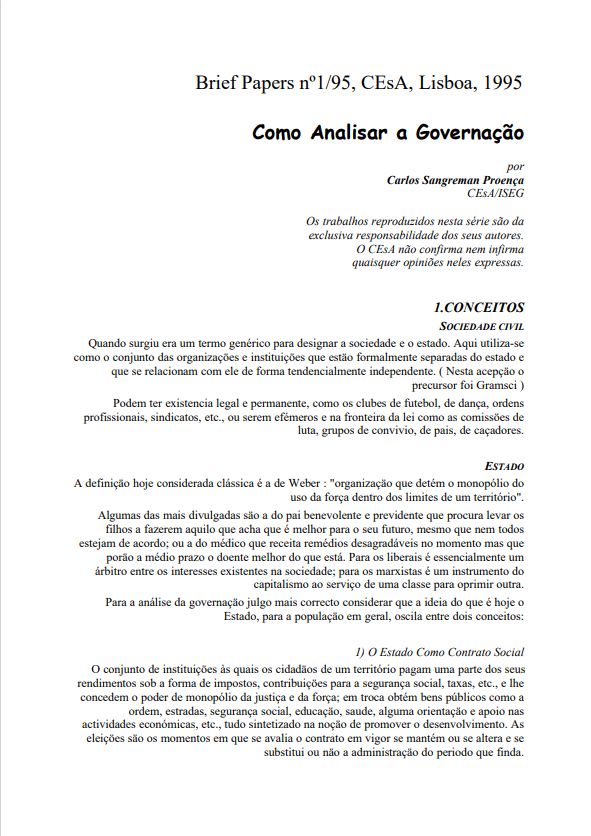
Brief Paper 1/1995: Como Analisar a Governação
Abstract:
Although the issue of Como analisar a governação is still at the beginning of the discussion in the scientific community, a set of criteria seems to be emerging, little by little, as consensual. For some of them, there is still the problem of which indicators to use, how to quantify them or what normative scale to define in order to assess them, and there are few practical applications of analysis to specific countries. And research needs to be done. The criteria for evaluating governance can be summarised in five groups, which can be applied to the notion of the Contract State and a softer version of the Arena State, where the interest groups that hold power assume the position of the medieval lord with the obligation to look after the welfare of the people, but never forgetting that his family and those close to him come first. Nobody is fully represented by another, and the further away that other is culturally and physically, the weaker the link. Thus, the population that feels that the Members of Parliament in Lisbon or Strasbourg are distant from its problems, tends socially to behave in defence, attack or seek alternatives, always with little credit for those who are far away and do not know each other.
Quotation:
Sangreman, Carlos. 1995. “Como analisar a governação”. Instituto Superior de Economia e Gestão – CEsA Brief Papers nº 1-1995.





